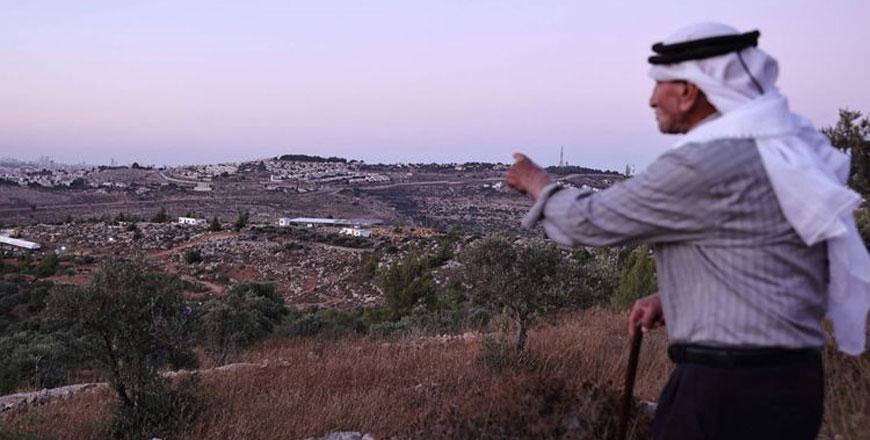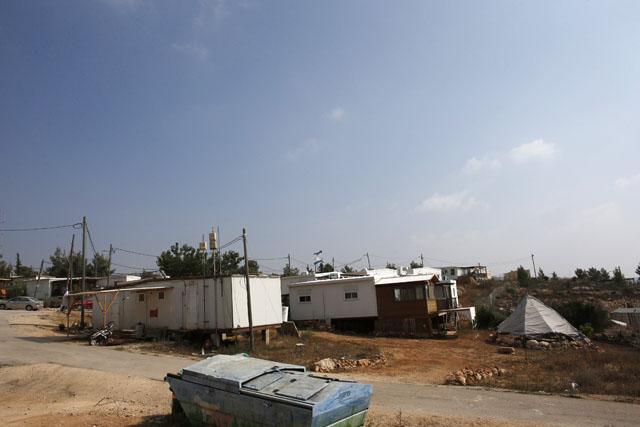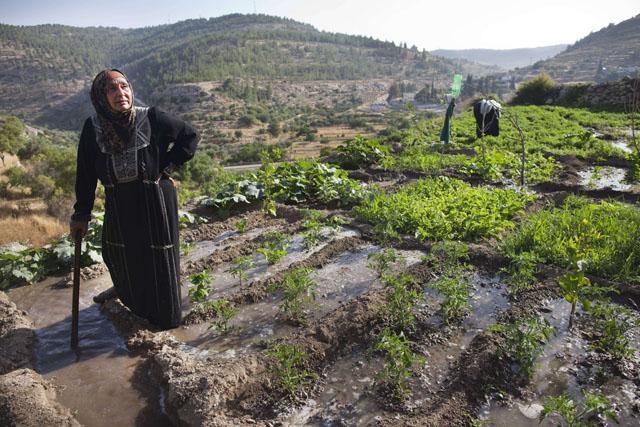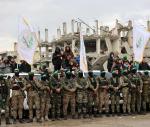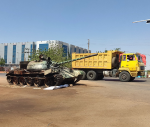You are here
Israeli land grabs spike in West Bank during Gaza war
By AFP - Apr 26,2024 - Last updated at Apr 26,2024

A general view taken on April 16, shows a mosque and cultivated fields outside the Palestinian village of Jiftlik in the occupied West Bank, north of Jericho by the Jordan River, where a military base (not pictured) is built on confiscated land from the village (AFP photo)
"Do you see these troughs? We had to sell some sheep to feed the others. Within a year, we will not have any sheep left," the 65-year-old told AFP at his farm near the Jordan Valley village of Jiftlik in the occupied West Bank.
In March, Israeli authorities declared 8,000 dunams adjacent to Edais's home — an area including his sheep's grazing grounds — as state land, a move that often leads to restrictions on Palestinians' access.
Israel, which has occupied the West Bank since 1967 and established settlements that are deemed illegal under international law, has for decades seized land in the Palestinian territory.
But according to Israeli settlement watchdog Peace Now, this year has already broken a record for most land grabs, which in many cases lead to settlement expansion.
The advocacy group said that 10,971 dunams of West Bank land have been seized by Israel so far in 2024, as much of the world's attention has been focused on the devastating Hamas-Israel war in the Gaza Strip since October 7.
The previous yearly record, according to Peace Now, was 5,200 dunams seized in 1999.
Declaring an area as state land makes the Israeli government its owner, and technically should not affect farming or other uses until the lot is reallocated for development or handed over to private owners.
However, Peace Now found in 2018 that "99.76 per cent of state land allocated for any use in the occupied West Bank was allocated for the needs of Israeli settlements".
From the lot that Edais and 50 of his relatives have lived on since 1976, near the Jordanian border, the farmer can see the nearby settlement of Masua and an Israeli army base.
Before the Israeli seizure order had even taken effect, he said settlers captured his sheep, claiming the animals had entered an off-limits area.
To retrieve them, his family was made to pay 150,000 shekels (about $39,500) to the Jordan Valley Regional Council, an administrative body of about two dozen settlements including Masua.
Rights groups have decried the increasing use of similar tactics that encourage Palestinian displacement from lands coveted by settlers.
The Israeli defence ministry body responsible for Palestinian civil affairs, COGAT, and the office in charge of state lands, did not respond to repeated requests by AFP for comment.
Hamad Audi, a 55-year-old construction worker who lives in Jiftlik, told AFP that what had happened to Edais came as no surprise.
“The law is in the hands of the settlers, and the state [Israel]stands with them,” Audi said.
According to him, many houses in the village have been handed demolition notices by Israeli authorities and one already demolished.
In March, 206 dunams bordering Jiftlik were declared as a state-owned archaeological site and placed under the authority of the Jordan Valley settlement council.
The area — a rocky mound where a former British Mandate-era prison and an Ottoman-era building stand — is now inaccessible to Palestinians living right next to it.
Displacement fears
Some 490,000 Israeli settlers live in the West Bank alongside three million Palestinians.
While settlements have consistently expanded under successive Israeli administrations, “in the last year we’ve seen a lot of developments”, said Yonatan Mizrahi, director of settlement watch for Peace Now.
Israel’s government, formed less than a year before the Gaza war broke out, includes extreme-right parties which support settlement expansion and politicians who call for the annexation of the West Bank.
To Audi, Palestinian life in the area is in danger.
“I expect that the population of the entire Jordan Valley area will be displaced,” he said.
According to Mizrahi, many Israelis believe that “the Jordan Valley should be in Israeli hands no matter what” due to its geographical location as a buffer zone between the West Bank and Jordan — with which Israel has signed a peace deal in 1994.
Palestinian communities in the Jordan Valley, many of them farm-based, “have very little power”, Mizarhi added.
Beyond land seizures, he said some of the recent government decisions concerning the West Bank include the expansion of the Jordan Valley Regional Council’s jurisdiction and increased funding for settlements.
And unauthorised settler outposts, which are technically illegal not only under international law but under Israeli law too, have increasingly been given official approval.
Edais, the herder, said he believes that Israel has used the Gaza war to accelerate its land grabs in the West Bank.
“They found... an excuse to expel people,” he said, “but here, there is no war! The war in Gaza is 200 kilometres away from us”.
Related Articles
BATTIR, Palestinian Territories — On a hillside near Palestinian landowner Olayan Olayan’s olive groves, young Israeli settlers are hammerin
Israel announced Sunday it will expropriate 400 hectares of Palestinian land in the occupied West Bank, angering the Palestinians and alarming Israeli peace campaigners.
Palestinian President Mahmoud Abbas said Sunday he was not looking “to flood Israel” with returning Palestinian refugees, at a rare meeting with 250 Israeli students at his West Bank headquarters.


